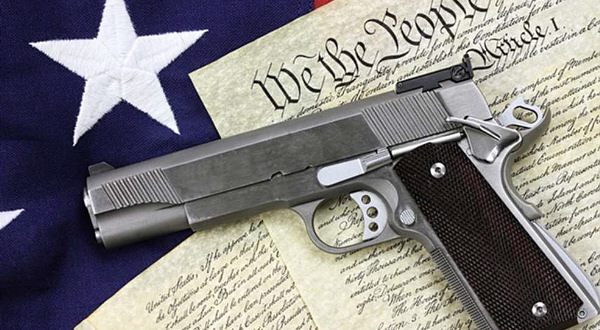

Issa & Stefanik Reintroduce
Modern Firearm Safety Act

By Susanne Edward. Aug 9, 2025
Article Source
Reps. Darrell Issa (R-Cali.) and Elise Stefanik (R-N.Y.) recently reintroduced H.R. 4676, the Modern Firearm Safety Act, aiming to nullify what they call unconstitutional handgun roster laws bloated with burdensome "safety" mandates in states such as California and New York.
Stefanik, chair of House GOP leadership, decried these roster mandates as tools wielded by "Far Left Democrats like [New York Gov.] Kathy Hochul" to deter legal gun ownership through indirect bans. The legislation would prohibit states from requiring gun manufacturers to adopt expensive features, such as loaded-chamber indicators or microstamping, that effectively block new handgun models from hitting the market.
Issa underscored the federal dimension of the bill, framing it as a necessary response to "anti-Second Amendment laws" masquerading as safety regulations.
Why Handgun Rosters Matter
Handgun rosters are essentially approved model lists that firearms must conform to be sold in states like California and New York. Critics argue these rosters are not safety measures but de facto bans, delaying or permanently excluding new models via prohibitive testing costs and design mandates.
Since the 2022 Bruen decision, which struck down New York's "proper cause" requirement in concealed-carry licensing and anchored constitutional scrutiny in historical tradition, lawsuits against other restrictive firearm laws have accelerated. Issa and Stefanik's bill helps to prohibit mandating modern innovations in gun regulation, as such requirement conflict with the protections of the Second Amendment.
The State Battlegrounds: California and New York
California remains among the strictest gun-control states. In addition to handgun rosters, it levied an 11% excise tax on gun and ammunition sales in 2024, going beyond what federal law stipulates.
In addition, in March 2025, the U.S. Department of Justice initiated a pattern-or-practice investigation into the Los Angeles County Sheriff's Department, alleging prolonged delays in concealed carry licensing—a burden on law-abiding citizens, effectively blocking fundamental Second Amendment rights. The DOJ emphasized that courts have confirmed the Second Amendment is not a "second-class right."
A recent federal appeals court in the 9th Circuit also ruled that California's law requiring background checks for ammunition purchases is unconstitutional, branding it an undue restriction on self-defense rights. Together, these developments paint a picture: California's restrictive policies are now facing coordinated federal and judicial pushback.
Meanwhile, the NY SAFE Act of 2013 established universal background checks, bans on assault weapons, and strict magazine limits, later modified to allow 10-round magazines. In the wake of Bruen, several appeals courts reaffirmed much of New York's concealed carry regulations, including restrictions around "sensitive areas" and its "good moral character" licensing requirements. In April 2025, the Supreme Court declined to hear a challenge, effectively allowing the law to remain.
Stefanik and Issa's bill directly targets similar state-level mandates—specifically prohibiting states from enforcing handgun roster laws that restrict model availability under the guise of safety.
The Broader National Push for Second Amendment Enforcement
The Modern Firearm Safety Act is part of a larger Republican-led effort to push back against perceived overreach in blue states. Key elements of the broader Republican-led effort include federal prohibitions on state excise taxes that target firearms and ammunition sales, Department of Justice investigations into local entities that delay or deny carry rights, and maintaining legal momentum following the Heller (2008) and Bruen (2022) decisions to challenge modern regulations through constitutional litigation.
These measures reflect a strategic alignment of legislative, executive, and judicial tools to uphold what supporters argue are fundamental, constitutionally guaranteed rights.
A Renewed Federal-State Clash
The Modern Firearm Safety Act is not merely a legislative fix; it is a symbolic and strategic posture. It seeks to rein in state regulatory overreach, particularly where laws function as indirect bans rather than genuine safety protocols. It also champions the principle that "the Second Amendment is not a second-class right," echoing rhetoric from both the Department of Justice and the Supreme Court.
Furthermore, it leverages the post-Bruen shift toward historical-meaning scrutiny to challenge modern gun-control measures currently in place. Gun-rights advocates argue that entrenched rules in California and New York, such as roster restrictions, ammunition taxation, and licensing delays, pose existential threats to the exercise of Second Amendment rights. They view federal counter-legislation not as a political gesture, but as a necessary step to restore constitutional boundaries.
Ultimately, Issa and Stefanik's reintroduction of the Modern Firearm Safety Act reboots a national confrontation between federal lawmakers and restrictive state regimes.
If enacted, the Act would help reshape the dynamic between state-level regulation and federally protected rights. It marks a pivotal moment in the broader struggle over how far states may go in regulating firearms—and how resolutely constitutional defenders intend to push back.
![]()
























